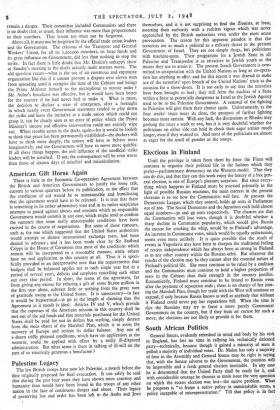American Gift Horse Again
There is little in the Economic Co-operation Agreement between the British and American Governments to justify the loose talk, current in various quarters before its publication, to the effect that the conditions of aid would be so unreasonable and humiliating that the agreement would have to be rejected. It is true that there is something in its rather admonitory tone and in its rather suspicious attempts to guard against abuses and evasions which no responsible Government would commit in any case, which might tend to confirm the rumours that some really unacceptable conditions have been excised in the course of negotiations. But some of those rumours, such as the one which suggested that the United States authorities would attempt to dictate international exchange rates, had been denied in advance ; and it has been made clear by Sir Stafford Cripps in the House of Commons that most of the conditions which remain will be interpreted in a reasonable manner, while others have no real application to this country at all. Thus it is speci- fically provided in an interpretative note that the requirements that budgets shall be balanced applies not to each single year but to a period of several years, deficits and surpluses cancelling each other out over that period. In short, the terms of the agreement, far from giving any excuse for refusing a gift of some $1,000 million in the first year alone, subtract little or nothing from the great sum of gratitude owing to the United States. It is unnecessary—in fact it would be hypocritical—to go to the length of claiming that the Agreement as it stands is ideal. Articles IV and V, which provide that the expenses of the American mission in this country shall be met out of the aid funds and that materials purchased for the United States shall be paid for not in dollars but sterling, simply detract from the main object of the Marshall Plan, which is to assist the recovery of Europe and restore its dollar balance. Any one of a dozen stiffly phrased conditions, which have no application at the moment, could be applied with effect by a really ill-disposed administration. But what sense is there in talking of ill-will on the part of so amazingly generous a benefactor ?






































 Previous page
Previous page